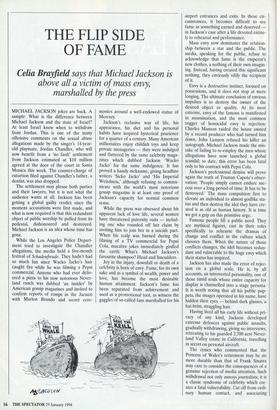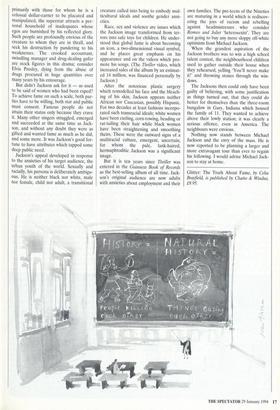THE FLIP SIDE OF FAME
Celia Brayfield says that Michael Jackson is
above all a victim of mass envy, marshalled by the press
MICHAEL JACKSON jokes are back. A sample: What is the difference between Michael Jackson and the state of Israel? At least Israel knew when to withdraw from Jordan. This is one of the many offensive comments on the sexual abuse allegations made by the singer's 14-year- old playmate, Jordan Chandler, who will now benefit from a 'no fault' settlement from Jackson estimated at $10 million agreed at the door of the court in Santa Monica this week. The counter-charge of extortion filed against Chandler's father, a dentist, was also dropped.
The settlement may please both parties and their lawyers, but it is not what the audience wants at all. Jackson has been getting a global guilty verdict since the moment accusations were first made, and what is now required is that this redundant object of public worship be pulled from its pedestal, dishonoured and destroyed. Michael Jackson is an idea whose time has gone.
While the Los Angeles Police Depart- ment tried to investigate the Chandler allegations, the media held a five-month festival of Schadenfreude. They hadn't had so much fun since Wacko Jacko's hair caught fire while he was filming a Pepsi commercial. Anyone who had ever deliv- ered a pizza to his now notorious Never- land ranch was dubbed 'an insider' by American gossip magazines and invited to confirm reports of romps in the Jacuzzi with Marlon Brando and secret cere- monies around a well-endowed statue of Mercury.
Jackson's reclusive way of life, his appearance, his diet and his personal habits have inspired hysterical prurience for a quarter of a century. Many American millionaires enjoy childish toys and keep private menageries — they were indulged and flattered by the same celebrity maga- zines which dubbed Jackson Wacko Jacko' for the same indulgence. It has proved a handy nickname, giving headline writers `Sicko Jacko' and 'His Imperial Weirdness,' although refusing to commu- nicate with the world's most notorious gossip magazine is at least one proof of Jackson's capacity for normal common sense.
While the press was obsessed about his apparent lack of love life, several women have threatened paternity suits — includ- ing one who rounded off her claim by inviting him to join her in a suicide pact. When his scalp was burned during the filming of a TV commercial for Pepsi Cola, macabre jokes immediately girdled the earth: What's Michael Jackson's favourite shampoo? Head and Smoulders.
Joy in the injury, downfall or death of a celebrity is born of envy. Fame, for its own sake and as a symbol of wealth, power and love, has become the most desirable human attainment. Jackson's fame has been separated from achievement and used as a promotional tool, as witness the gaggles of so-called fans marshalled for his
airport entrances and exits. In these cir- cumstances, it becomes difficult to see fame as something earned and deserved in Jackson's case after a life devoted entire- ly to rehearsal and performance.
Mass envy now dominates the relation- ship between a star and the public. The media, speaking for the public, refuse to acknowledge that fame is the emperor's new clothes, a nothing of their own imagin- ing. Instead, having created this significant nothing, they enviously vilify the recipient of it.
Envy is a destructive instinct, focused on possessions, and it does not stop at mere longing. The ultimate conclusion of envious impulses is to destroy the owner of the desired object or quality. At its most extreme, envy of the famous is manifested in assassination, and the most common trigger of homicidal envy is rejection: Charles Manson raided the house owned by a record producer who had turned him down, John Lennon refused his killer an autograph. Michael Jackson made the mis- take of failing to re-employ the men whose allegations have now launched a global scandal; to date, this error has been fatal only to his contract with Pepsi Cola.
Jackson's professional demise will prove again the truth of Truman Capote's obser- vation: `People simply cannot endure suc- cess over a long period of time. It has to be destroyed.' The mass compulsion first to elevate an individual to almost godlike sta- tus and then destroy the idol they have cre- ated is as old as human history. It is time we got a grip on this primitive urge.
Famous people fill a public need. They are mythical figures, cast in their roles specifically to rehearse the dramas of change and conflict in the culture which chooses them. When the nature of those conflicts changes, the idol becomes redun- dant and vulnerable to the huge envy which their status has inspired.
Jackson has also made the error of rejec- tion on a global scale. He is, by all accounts, an introverted personality, one of those timid souls whose entire capacity for display is channelled into a stage persona.
It is worth noting that all his public pup- pets, the images operated in his name, have hidden their eyes — behind dark glasses, a hat-brim, straggling hair.
Having lived all his early life without pri- vacy of any kind, Jackson developed extreme defences against public assaults, gradually withdrawing, giving no interviews, retreating to his guarded 2,700-acre Never- land Valley estate in California, travelling in secret on personal aircraft.
The cynics who commented that the Princess of Wales's retirement may be no more durable than that of Frank Sinatra may care to consider the consequences of a genuine rejection of media attention. Such withdrawal not only annoys journalists; it is a classic syndrome of celebrity which cre- ates a fatal vulnerability. Cut off from ordi- nary human contact, and associating primarily with those for whom he is a colossal dollar-earner to be placated and manipulated, the superstar attracts a per- sonal household of inadequates whose egos are burnished by his reflected glory. Such people are profoundly envious of the creature to whom they are in thrall, and seek his destruction by pandering to his weaknesses. The crooked accountant, swindling manager and drug-dealing gofer are stock figures in this drama; consider Elvis Presley, dying from the abuse of drugs procured in huge quantities over many years by his entourage.
But didn't Jackson ask for it — as used to be said of women who had been raped? To achieve fame on such a scale, both par- ties have to be willing, both star and public must consent. Famous people do not attain their status only because they crave it. Many other singers struggled, emerged and succeeded at the same time as Jack- son, and without any doubt they were as gifted and wanted fame as much as he did, and some more. It was Jackson's good for- tune to have attributes which tapped some deep public need.
Jackson's appeal developed in response to the anxieties of his target audience, the urban youth of the world. Sexually and racially, his persona is deliberately ambigu- ous. He is neither black nor white, male nor female, child nor adult, a transitional creature called into being to embody mul- ticultural ideals and soothe gender anxi- eties.
Race, sex and violence are issues which the Jackson image transformed from ter- rors into safe toys for children. He under- stood that global fame is about becoming an icon, a two-dimensional visual symbol, and he places great emphasis on his appearance and on the videos which pro- mote his songs. (The Thriller video, which increased sales of the album by an estimat- ed 14 million, was financed personally by Jackson.) After the notorious plastic surgery which remodelled his face and the bleach- ing of his skin, Jackson appears neither African nor Caucasian, possibly Hispanic. For two decades at least fashions incorpo- rated such transracial ideals; white women have been curling, corn-rowing, beading or rat-tailing their hair while black women have been straightening and smoothing theirs. These were the outward signs of a multiracial culture, emergent, uncertain, for whom the pale, lank-haired, hermaphroditic Jackson was a significant image.
But it is ten years since Thriller was entered in the Guinness Book of Records as the best-selling album of all time. Jack- son's original audience are now adults with anxieties about employment and their own families. The pre-teens of the Nineties are maturing in a world which is rediscov- ering the joys of racism and rebelling against headmistresses who consider Romeo and Juliet 'heterosexist'. They are not going to buy any more sloppy off-white optimism from Michael Jackson.
When the grandest aspiration of the Jackson brothers was to win a high school talent contest, the neighbourhood children used to gather outside their house when they rehearsed, yelling 'You'll never make it!' and throwing stones through the win- dows.
The Jacksons then could only have been guilty of believing, with some justification as things turned out, that they could do better for themselves than the three-room bungalow in Gary, Indiana which housed the family of 11. They wanted to achieve above their lowly station; it was clearly a serious offence, even in America. The neighbours were envious.
Nothing now stands between Michael Jackson and the envy of the mass. He is now reported to be planning a larger and more extravagant tour than ever to regain his following. I would advise Michael Jack- son to stay at home.
Glitter: The Truth About Fame, by Celia Brayfield, is published by Chatto & W7ndus, f9.95.



































































 Previous page
Previous page